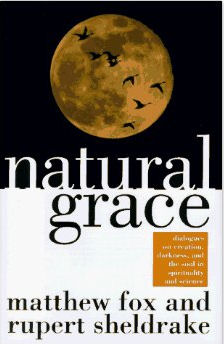 Natural Grace, a 208 page inspired dialogue between theologian Matthew Fox and scientist Rupert Sheldrake, unites wisdom and knowledge from unconventional angles. Considering themselves heretics in their own fields, Matthew and Rupert engage the conversation from postmodern and post-postmodern perspectives, deconstructing both religion and science—while setting the foundation for a new emerging worldview. Having outgrown the paradigms in which they were raised, both Fox and Sheldrake see it as part of their life missions to share the natural synthesis of spirituality and science rooted in a paradigm of evolutionary cosmology.
Natural Grace, a 208 page inspired dialogue between theologian Matthew Fox and scientist Rupert Sheldrake, unites wisdom and knowledge from unconventional angles. Considering themselves heretics in their own fields, Matthew and Rupert engage the conversation from postmodern and post-postmodern perspectives, deconstructing both religion and science—while setting the foundation for a new emerging worldview. Having outgrown the paradigms in which they were raised, both Fox and Sheldrake see it as part of their life missions to share the natural synthesis of spirituality and science rooted in a paradigm of evolutionary cosmology.
The conversations in the book range a wide spectrum of enlightening topics—from perceiving nature as a living organism and deconstructing the metaphor of mechanism, to ritual, grace, and darkness. Fox and Sheldrake draw from their rich backgrounds of experience—both have a doctorate education; Matt Fox created a graduate program in Creation Spirituality; Rupert Sheldrake is the renowned creator of the morphic field theory. Their deep, passionate life interests in philosophy shines throughout the book, drawing on thinkers from all epochs—the Greeks, the Medieval Ages, the Renaissance, the Enlightenment, the Romantics, and Modern Science; throughout the text one enjoys an overview of the last 2,500 years of thought.
The central focus of Natural Grace is the re-enchantment of nature; Fox draws on the Mystics, most notably in Medieval Christianity—Hildegard of Bingen, Francis of Assisi, Thomas Aquinas, and Meister Eckhart—and Sheldrake draws on the philosophy of science, as well as current scientific knowledge. Personally, my favorite is his model of fields as the most up to date lens to understand souls. Science has used the concept of fields mostly in physics, for gravity and electricity, but Sheldrake brings the concept into chemistry, biology, and psychology. Fields, as put forward by Sheldrake, are self-organizing, evolving, experiential processes. When we come to see consciousness, and all of nature, of a multi-layered web of fields, the interconnected and nondual aspects of existence come into focus. And, the implications of fields as holding memory run deep; Fox, trained as a theologian and priest, discusses how these fields are affected by rituals and prayer, while Sheldrake, trained as a biologist, believes they shed light on our collective evolution. Together, this well qualified dynamic duo bring a unique synthesis to science and spirituality.
Natural Grace, the enjoyable explorations of the implications of our current cosmology, leads us through through physics, chemistry, biology, psychology, philosophy, sociology, art, education, and religion—east and west. Both men see the limitations of the prior mechanistic, material paradigm—in religion, science, economics, academia, etc—and are passionate about transforming our world. The dialogue is clear, intelligent, and inspiring; the reader will walk away feeling uplifted. Well titled, every word in Natural Grace moves with Spirit. One experiences the reverence of existence in both men—resonating a feeling of holiness through the text.
~~ Jahan Khamsehzadeh doctoral student, California Institute of Integral Studies cosmology program